中国四大传统节日英文介绍分析
- 格式:docx
- 大小:38.50 KB
- 文档页数:17
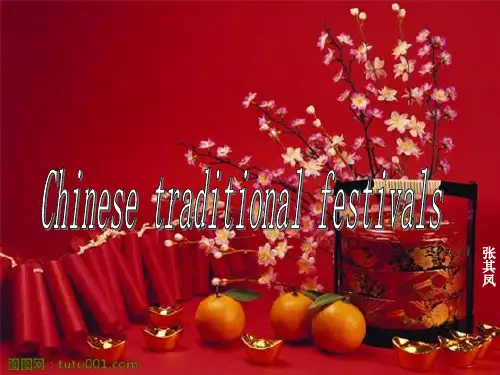
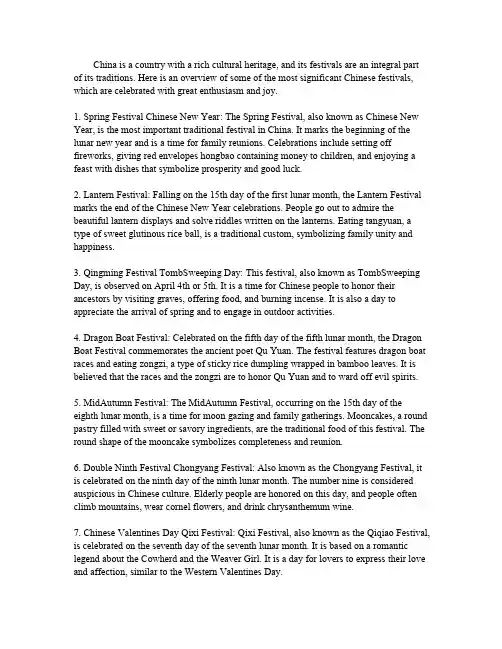
China is a country with a rich cultural heritage,and its festivals are an integral part of its traditions.Here is an overview of some of the most significant Chinese festivals, which are celebrated with great enthusiasm and joy.1.Spring Festival Chinese New Year:The Spring Festival,also known as Chinese New Year,is the most important traditional festival in China.It marks the beginning of the lunar new year and is a time for family reunions.Celebrations include setting off fireworks,giving red envelopes hongbao containing money to children,and enjoying a feast with dishes that symbolize prosperity and good luck.ntern Festival:Falling on the15th day of the first lunar month,the Lantern Festival marks the end of the Chinese New Year celebrations.People go out to admire the beautiful lantern displays and solve riddles written on the lanterns.Eating tangyuan,a type of sweet glutinous rice ball,is a traditional custom,symbolizing family unity and happiness.3.Qingming Festival TombSweeping Day:This festival,also known as TombSweeping Day,is observed on April4th or5th.It is a time for Chinese people to honor their ancestors by visiting graves,offering food,and burning incense.It is also a day to appreciate the arrival of spring and to engage in outdoor activities.4.Dragon Boat Festival:Celebrated on the fifth day of the fifth lunar month,the Dragon Boat Festival commemorates the ancient poet Qu Yuan.The festival features dragon boat races and eating zongzi,a type of sticky rice dumpling wrapped in bamboo leaves.It is believed that the races and the zongzi are to honor Qu Yuan and to ward off evil spirits.5.MidAutumn Festival:The MidAutumn Festival,occurring on the15th day of the eighth lunar month,is a time for moon gazing and family gatherings.Mooncakes,a round pastry filled with sweet or savory ingredients,are the traditional food of this festival.The round shape of the mooncake symbolizes completeness and reunion.6.Double Ninth Festival Chongyang Festival:Also known as the Chongyang Festival,it is celebrated on the ninth day of the ninth lunar month.The number nine is considered auspicious in Chinese culture.Elderly people are honored on this day,and people often climb mountains,wear cornel flowers,and drink chrysanthemum wine.7.Chinese Valentines Day Qixi Festival:Qixi Festival,also known as the Qiqiao Festival, is celebrated on the seventh day of the seventh lunar month.It is based on a romantic legend about the Cowherd and the Weaver Girl.It is a day for lovers to express their love and affection,similar to the Western Valentines Day.8.National Day:Celebrated on October1st,National Day marks the founding of the Peoples Republic of China.It is a public holiday with various celebrations,including parades,fireworks,and other festive activities.These festivals are not only a time for celebration but also an opportunity for Chinese people to pass down their cultural heritage and values to future generations.Each festival has its unique customs and traditions that reflect the rich and diverse culture of China.。
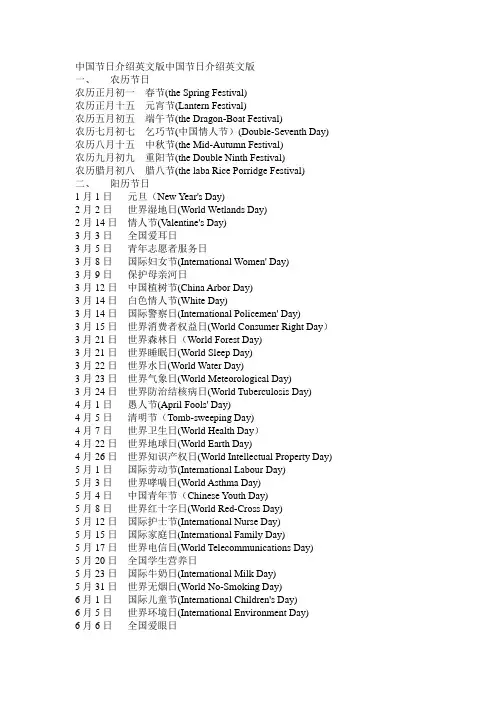
中国节日介绍英文版中国节日介绍英文版一、农历节日农历正月初一春节(the Spring Festival)农历正月十五元宵节(Lantern Festival)农历五月初五端午节(the Dragon-Boat Festival)农历七月初七乞巧节(中国情人节)(Double-Seventh Day) 农历八月十五中秋节(the Mid-Autumn Festival)农历九月初九重阳节(the Double Ninth Festival)农历腊月初八腊八节(the laba Rice Porridge Festival)二、阳历节日1月1日元旦(New Year's Day)2月2日世界湿地日(World Wetlands Day)2月14日情人节(Valentine's Day)3月3日全国爱耳日3月5日青年志愿者服务日3月8日国际妇女节(International Women' Day)3月9日保护母亲河日3月12日中国植树节(China Arbor Day)3月14日白色情人节(White Day)3月14日国际警察日(International Policemen' Day)3月15日世界消费者权益日(World Consumer Right Day)3月21日世界森林日(World Forest Day)3月21日世界睡眠日(World Sleep Day)3月22日世界水日(World Water Day)3月23日世界气象日(World Meteorological Day)3月24日世界防治结核病日(World Tuberculosis Day)4月1日愚人节(April Fools' Day)4月5日清明节(Tomb-sweeping Day)4月7日世界卫生日(World Health Day)4月22日世界地球日(World Earth Day)4月26日世界知识产权日(World Intellectual Property Day) 5月1日国际劳动节(International Labour Day)5月3日世界哮喘日(World Asthma Day)5月4日中国青年节(Chinese Youth Day)5月8日世界红十字日(World Red-Cross Day)5月12日国际护士节(International Nurse Day)5月15日国际家庭日(International Family Day)5月17日世界电信日(World Telecommunications Day)5月20日全国学生营养日5月23日国际牛奶日(International Milk Day)5月31日世界无烟日(World No-Smoking Day)6月1日国际儿童节(International Children's Day)6月5日世界环境日(International Environment Day)6月6日全国爱眼日6月17日世界防治荒漠化和干旱日(World Day to combat desertification)6月23日国际奥林匹克日(International Olympic Day)6月25日全国土地日6月26日国际禁毒日(International Day Against Drug Abuse and Illicit Trafficking)7月1日中国共产党诞生日(Anniversary of the Founding of the Chinese Communist Party)7月1日国际建筑日(International Architecture Day)7月7日中国人民抗日战争纪念日7月11日世界人口日(World Population Day)8月1日中国人民解放军建军节(Army Day)8月12日国际青年节(International Youth Day)9月8日国际扫盲日(International Anti-illiteracy Day)9月10日中国教师节(Teacher's Day)9月16日中国脑健康日9月16日国际臭氧层保护日(International Day for the Preservation of the Ozone Layer)9月20日全国爱牙日9月21日世界停火日(World Cease-fire Day)9月27日世界旅游日(World Tourism Day)10月1日中华人民共和国国庆节(National Day)10月1日国际音乐日(International Music Day)10月1日国际老年人日(International Day of Older Persons)。
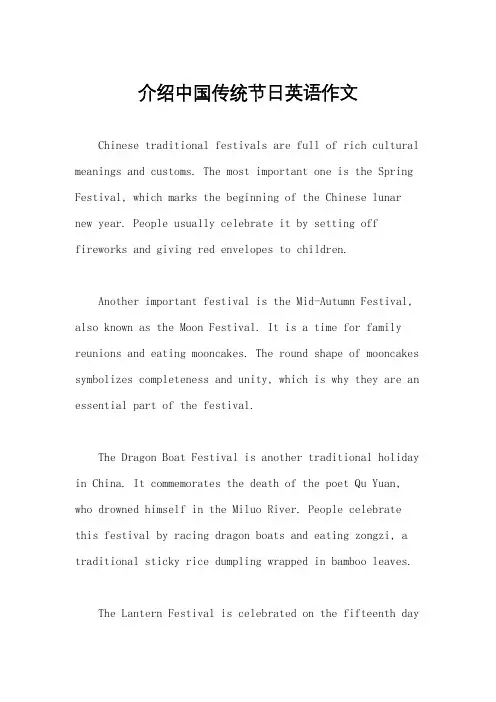
介绍中国传统节日英语作文Chinese traditional festivals are full of rich cultural meanings and customs. The most important one is the Spring Festival, which marks the beginning of the Chinese lunar new year. People usually celebrate it by setting off fireworks and giving red envelopes to children.Another important festival is the Mid-Autumn Festival, also known as the Moon Festival. It is a time for family reunions and eating mooncakes. The round shape of mooncakes symbolizes completeness and unity, which is why they are an essential part of the festival.The Dragon Boat Festival is another traditional holiday in China. It commemorates the death of the poet Qu Yuan, who drowned himself in the Miluo River. People celebrate this festival by racing dragon boats and eating zongzi, a traditional sticky rice dumpling wrapped in bamboo leaves.The Lantern Festival is celebrated on the fifteenth dayof the first lunar month. People light lanterns and solve riddles written on them. It is also a time for eating yuanxiao, a type of sweet rice ball.Traditional Chinese festivals are not only about celebrating, but also about passing down cultural heritage and values. They are a time for family, tradition, and reflection.。
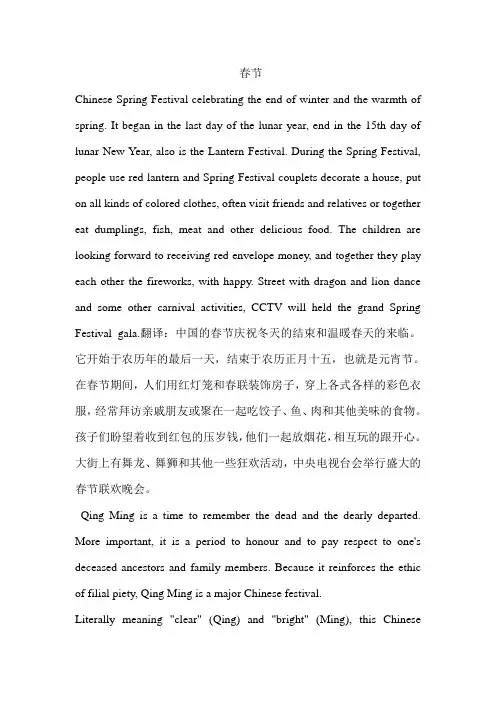
春节Chinese Spring Festival celebrating the end of winter and the warmth of spring. It began in the last day of the lunar year, end in the 15th day of lunar New Year, also is the Lantern Festival. During the Spring Festival, people use red lantern and Spring Festival couplets decorate a house, put on all kinds of colored clothes, often visit friends and relatives or together eat dumplings, fish, meat and other delicious food. The children are looking forward to receiving red envelope money, and together they play each other the fireworks, with happy. Street with dragon and lion dance and some other carnival activities, CCTV will held the grand Spring Festival gala.翻译:中国的春节庆祝冬天的结束和温暖春天的来临。
它开始于农历年的最后一天,结束于农历正月十五,也就是元宵节。
在春节期间,人们用红灯笼和春联装饰房子,穿上各式各样的彩色衣服,经常拜访亲戚朋友或聚在一起吃饺子、鱼、肉和其他美味的食物。
孩子们盼望着收到红包的压岁钱,他们一起放烟花,相互玩的跟开心。
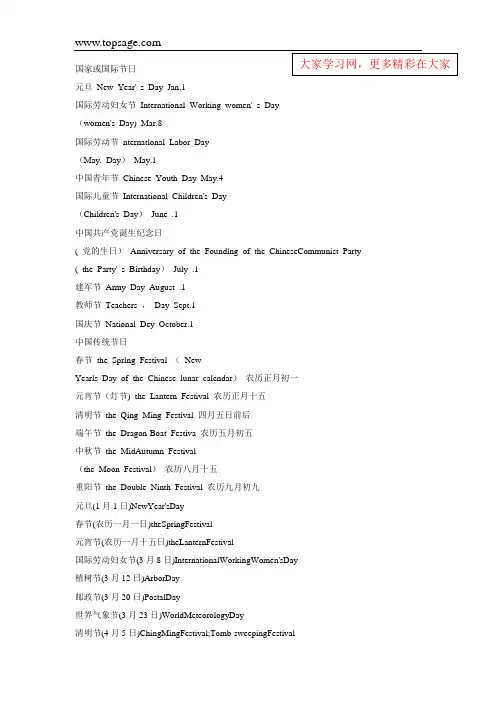
国家或国际节日元旦New Year' s Day Jan.1国际劳动妇女节International Working women' s Day(wornen's Day) Mar.8国际劳动节nternatlonal Labor Day(May. Day)May.1中国青年节Chinese Youth Day May.4国际儿童节International Children's Day(Children's Day)June .1中国共产党诞生纪念日( 党的生日)Anniversary of the Foundlng of the ChineseCommunist Party ( the Party' s Birthday)July .1建军节Army Day August .1教师节Teachers ,Day Sept.1国庆节National Dey October.1中国传统节日春节the Sprlng Festival (NewYearls Day of the Chinese lunar calendar)农历正月初一元宵节(灯节) the Lantern Festival 农历正月十五清明节the Qing Ming Festival 四月五日前后端午节the Dragon-Boat Festiva 农历五月初五中秋节the MidAutumn Festival(the Moon Festival)农历八月十五重阳节the Double Ninth Festival 农历九月初九元旦(1月1日)NewYear'sDay春节(农历一月一日)theSpringFestival元宵节(农历一月十五日)theLanternFestival国际劳动妇女节(3月8日)InternationalWorkingWomen'sDay植树节(3月12日)ArborDay邮政节(3月20日)PostalDay世界气象节(3月23日)WorldMeteorologyDay清明节(4月5日)ChingMingFestival;Tomb-sweepingFestival国际劳动节(5月1日)InternationalLabourDay中国青年节(5月4日)ChineseYouthDay护士节(5月12日)Nurses'Festival端午节(农历五月初五)theDragonBoatFestival国际儿童节(6月1日)InternationalChildren'sDay中国共产党成立纪念日(7月1日)theParty'sBirthday建军节(8月1日)theArmy'sDay中秋节(农历八月十五)Mid-autumn(Moon)Festival教师节(9月10日)Teachers'Day重阳节(农历九月九日)Double-ninthDay国庆节(10月1日)NationalDay除夕(农历十二月三十日)NewYear'sEve阳历节日1月1日元旦(New Year's Day)2月2日世界湿地日(World Wetlands Day)2月14日情人节(Valentine's Day)3月3日全国爱耳日3月5日青年志愿者服务日3月8日国际妇女节(International Women' Day)3月9日保护母亲河日3月12日中国植树节(China Arbor Day)3月14日白色情人节(White Day)3月14日国际警察日(International Policemen' Day)3月15日世界消费者权益日(World Consumer Right Day)3月21日世界森林日(World Forest Day)3月21日世界睡眠日(World Sleep Day)3月22日世界水日(World Water Day)3月23日世界气象日(World Meteorological Day)3月24日世界防治结核病日(World Tuberculosis Day)4月1日愚人节(April Fools' Day)4月5日清明节(Tomb-sweeping Day)4月7日世界卫生日(World Health Day)4月22日世界地球日(World Earth Day)4月26日世界知识产权日(World Intellectual Property Day)5月1日国际劳动节(International Labour Day)5月3日世界哮喘日(World Asthma Day)5月4日中国青年节(Chinese Youth Day)5月8日世界红十字日(World Red-Cross Day)5月12日国际护士节(International Nurse Day)5月15日国际家庭日(International Family Day)5月17日世界电信日(World Telecommunications Day)5月20日全国学生营养日5月23日国际牛奶日(International Milk Day)5月31日世界无烟日(World No-Smoking Day)6月1日国际儿童节(International Children's Day)6月5日世界环境日(International Environment Day)6月6日全国爱眼日6月17日世界防治荒漠化和干旱日(World Day to combat desertification)6月23日国际奥林匹克日(International Olympic Day)6月25日全国土地日6月26日国际禁毒日(International Day Against Drug Abuse and Illicit Trafficking)7月1日中国共产党诞生日(Anniversary of the Founding of the Chinese Communist Party) 7月1日国际建筑日(International Architecture Day)7月7日中国人民抗日战争纪念日7月11日世界人口日(World Population Day)8月1日中国人民解放军建军节(Army Day)8月12日国际青年节(International Youth Day)9月8日国际扫盲日(International Anti-illiteracy Day)9月10日中国教师节(Teacher's Day)9月16日中国脑健康日9月16日国际臭氧层保护日(International Day for the Preservation of the Ozone Layer) 9月20日全国爱牙日9月21日世界停火日(World Cease-fire Day)9月27日世界旅游日(World Tourism Day)10月1日中华人民共和国国庆节(National Day)10月1日国际音乐日(International Music Day)10月1日国际老年人日(International Day of Older Persons)10月4日世界动物日(World Animal Day)10月5日世界教师日(World Teachers' Day)(联合国教科文组织确立)10月8日全国高血压日10月9日世界邮政日(World Post Day)10月10日世界精神卫生日(World Mental Health Day)10月14日世界标准日(World Standards Day)10月15日国际盲人节(International Day of the Blind)10月15日世界农村妇女日(World Rural Women's Day)10月16日世界粮食日(World Food Day)10月17日国际消除贫困日(International Day for the Eradication of Poverty)10月24日联合国日(United Nations Day)10月24日世界发展新闻日(World Development Information Day)10月28日中国男性健康日10月29日国际生物多样性日(International Biodiversity Day)10月31日万圣节(Halloween)11月8日中国记者节11月9日消防宣传日11月14日世界糖尿病日(World Diabetes Day)11月17日国际大学生节11月25日国际消除对妇女的暴力日(International Day For the elimination of Violence agai nst Women)12月1日世界爱滋病日(World AIDS Day)12月3日世界残疾人日(World Disabled Day)12月4日全国法制宣传日12月9日世界足球日(World Football Day)12月25日圣诞节(Christmas Day)12月29日国际生物多样性日(International Biological Diversity Day)1月最后一个星期日国际麻风节3月最后一个完整周的星期一中小学生安全教育日春分月圆后的第一个星期日复活节(Easter Monday)(有可能是3月22-4月25日间的任一天) 5月第二个星期日母亲节(Mother's Day)5月第三个星期日全国助残日6月第三个星期日父亲节(Father's Day)9月第三个星期二国际和平日(International Peace Day)9月第三个星期六全国国防教育日9月第四个星期日国际聋人节(International Day of the Deaf)10月的第一个星期一世界住房日(World Habitat Day)10月的第二个星斯一加拿大感恩节(Thanksgiving Day)10月第二个星期三国际减轻自然灾害日(International Day for Natural Disaster Reduction) 10月第二个星期四世界爱眼日(World Sight Day)11月最后一个星期四美国感恩节(Thanksgiving Day)农历节日农历正月初一春节(the Spring Festival)农历正月十五元宵节(Lantern Festival)农历五月初五端午节(the Dragon-Boat Festival)农历七月初七乞巧节(中国情人节)(Double-Seventh Day)农历八月十五中秋节(the Mid-Autumn Festival)农历九月初九重阳节(the Double Ninth Festival)农历腊月初八腊八节(the laba Rice Porridge Festival)农历腊月二十四传统扫房日。
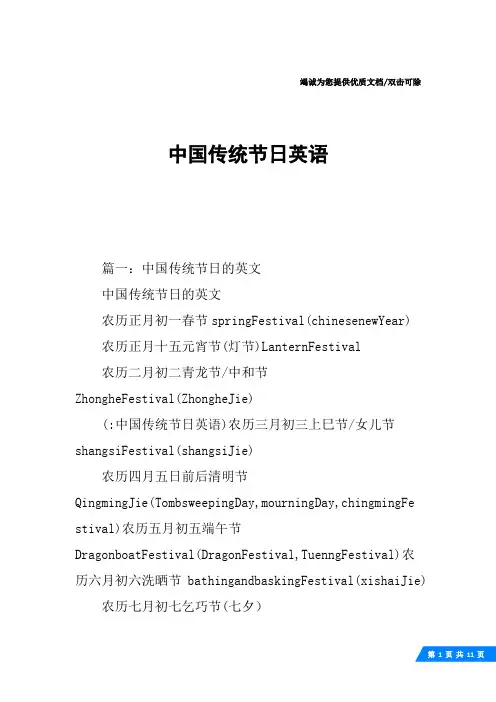
竭诚为您提供优质文档/双击可除中国传统节日英语篇一:中国传统节日的英文中国传统节日的英文农历正月初一春节springFestival(chinesenewYear)农历正月十五元宵节(灯节)LanternFestival农历二月初二青龙节/中和节ZhongheFestival(ZhongheJie)(:中国传统节日英语)农历三月初三上巳节/女儿节shangsiFestival(shangsiJie)农历四月五日前后清明节QingmingJie(TombsweepingDay,mourningDay,chingmingFe stival)农历五月初五端午节DragonboatFestival(DragonFestival,TuenngFestival)农历六月初六洗晒节bathingandbaskingFestival(xishaiJie) 农历七月初七乞巧节(七夕)Double-seventhDay/Thenightofsevens(magpieFestival,Q ixi)农历七月十五中元节spiritFestival(ghostFestival) 农历八月十五中秋节mid-AutumnFestival (moonFestival)农历九月初九重阳节DoubleninthFestival(Dual-YangFestival,chungYeungFes tival)农历十月十五下元节spiritFestival/waterLanternFestival农历十一月初七冬至wintersolsticeFestival(mid-winterFestival)农历腊月初八腊八节LabaFestival(congeeFestival) 农历的最后一天除夕chinesenewYeareve篇二:中国传统节日的英文翻译中国传统节日的英文翻译中国传统节日的英文翻译春节thespringFestival (newYearsDayofthechineselunarcalendar)农历正月初一元宵节(灯节)theLanternFestival农历正月十五清明节theQingmingFestival/Tomb-sweepingDay四月五日端午节theDragon-boatFestiva农历五月初五中秋节themidAutumnFestival(themoonFestival)农历八月十五重阳节theDoubleninthFestival农历九月初九其它节日的英文翻译元旦newYearsDayJan.1国际劳动妇女节InternationalworkingwomensDay (womensDay)mar.8国际劳动节nternatlonalLaborDay(may.Day)may.1中国青年节 国际儿童节InternationalchildrensDay (childrensDay)June.1中国共产党诞生纪念日(党的生日)AnniversaryoftheFoundlngofthechinesecommunistparty (thepartysbirthday)July.1建军节ArmyDayAugust.1 教师节TeachersDaysept.1国庆节nationalDeyoct.1篇三:中国传统节日的英文介绍和讨论中国传统节日的英文介绍和讨论I中国主要传统节日的英文翻译元旦(1月1日)newYearsDay春节(农历一月一日)thespringFestival元宵节(农历一月十五日)theLanternFestival清明节(4月5日)chingmingFestival;Tomb-sweepingFestival 端午节(农历五月初五)theDragonboatFestival中秋节(农历八月十五)mid-autumn(moon)Festival重阳节(农历九月九日)Double-ninthDay除夕(农历十二月三十日)newYearseveII新年习俗英译过年celebratethespringfestival春联springfestivalcouplets剪纸paper-cuts年画newyearpaintings买年货doshoppingforthespringFestival;dospringFestivalshop ping敬酒proposeatoast灯笼lantern烟花fireworks 爆竹firecrackers(peoplescareoffevilspiritsandghostswith theloudpop.)红包redpackets舞龙dragondance(toexpectgoodweatherandgoodharvests) 舞狮liondance(thelionisbelievedtobeabletodispelevilandb ringgoodluck.)戏曲traditionalopera杂耍varietyshow灯谜riddleswrittenonlanterns灯会exhibitoflanterns守岁staying-up禁忌taboo拜年paynewyearscall;givenewyearsgreetings;paynewyearsvi sit去晦气getridoftheill-fortune祭祖宗offersacrificestoonesancestors压岁钱giftmoney;moneygiventochildrenasalunarnewyeargift旧岁bidfarewelltotheoldyear扫房springcleaning;generalhouse-cleaning年糕nian-gao;risecake;newyearcake团圆饭familyreuniondinner年夜饭thedinneronnewyearseve 饺子jiaozi-;chinesemeatravioli,dumplingsIIIxInhuAnewsAgAencYRepoRT20XX-11-07beIJIng,nov.7(xinhua)--chinamayincreasethenumberofl egalholidaysandincludesometraditionalfestivals,such astheTomb-sweepingDay,theDragonboatFestivalandthemi d-AutumnFestival,aspartofthecountryslegalholidays,s ourcessaid.Thechinesegovernmenthasformedapreliminaryplanonthen ewlegalholidayarrangementandtheplanwillbereleased"inthenearfuture".Afterthatpublicopinionwillbesoughto ntheInternet.Asanancientcountrywithacivilizedhistoryofmorethan5, 000years,sometraditionalfestivalsrepresentpartofthe chinesenationsculturalheritage.however,currentlegal holidayarrangementonlyincludesthespringFestival.cai Jiming,professorwithTsinghuauniversityandmemberofth echinesepeoplespoliticalconsultativeconference(cppc c),saidthattraditionalfestivalsaslegalholidaywouldh elpreservethefolkcustoms."Thenationstraditionalculturewillfinditswaytodevelo p,"caisaid.FengJicai,arenownedchinesewriterwhoupholdsfolkcusto ms,saidtheculturalmeaningofchinesetraditionalfestiv alsshouldberestoredandemphasized,especiallywithincr easingglobalization.chinesepeoplecurrentlyhavetendaysoflegalholiday.nin edaysareformayDay,thenationalDayandthespringFestiva。
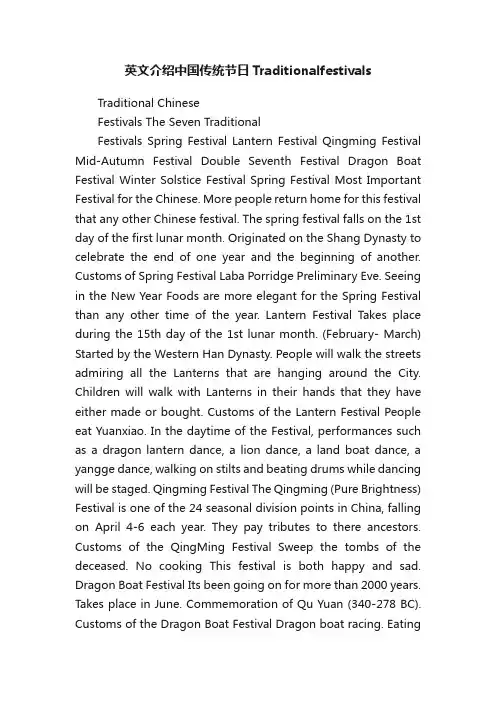
英文介绍中国传统节日TraditionalfestivalsTraditional ChineseFestivals The Seven TraditionalFestivals Spring Festival Lantern Festival Qingming Festival Mid-Autumn Festival Double Seventh Festival Dragon Boat Festival Winter Solstice Festival Spring Festival Most Important Festival for the Chinese. More people return home for this festival that any other Chinese festival. The spring festival falls on the 1st day of the first lunar month. Originated on the Shang Dynasty to celebrate the end of one year and the beginning of another. Customs of Spring Festival Laba Porridge Preliminary Eve. Seeing in the New Year Foods are more elegant for the Spring Festival than any other time of the year. Lantern Festival Takes place during the 15th day of the 1st lunar month. (February- March) Started by the Western Han Dynasty. People will walk the streets admiring all the Lanterns that are hanging around the City. Children will walk with Lanterns in their hands that they have either made or bought. Customs of the Lantern Festival People eat Yuanxiao. In the daytime of the Festival, performances such as a dragon lantern dance, a lion dance, a land boat dance, a yangge dance, walking on stilts and beating drums while dancing will be staged. Qingming Festival The Qingming (Pure Brightness) Festival is one of the 24 seasonal division points in China, falling on April 4-6 each year. They pay tributes to there ancestors. Customs of the QingMing Festival Sweep the tombs of the deceased. No cooking This festival is both happy and sad. Dragon Boat Festival Its been going on for more than 2000 years. Takes place in June. Commemoration of Qu Yuan (340-278 BC). Customs of the Dragon Boat Festival Dragon boat racing. Eatingzongzi. Drinking realga. Double Seventh Festival Takes place 7th day of the Seventh Lunar Month Festival full of romance. The legend is carried on with a story of two stars at opposite ends of the milky way. Customs of the Double Seventh have weekend over the years but is still carried on in some rural areas. Mid-Autumn Festival Falls on the 15th day of 8th lunar month. (October) In Mid-Autumn they honor the moon. People express there feelings. Customs of the Mid- Autumn Festival Show longing for a more prosperous life. Today people will enjoy the full moon and eat moon cakes on that day. This day was chosen because of the fullness of the moon at this time. Winter Solstice Festival Was started over 2500 years ago. Takes place on December 22 or 23. This is the shortest day light hours of any day of the year. Good things will become stronger and stronger after this day. People gather and eat food and celebrate that daylight hours are gettinglonger. Conclusion These are the main festivals of the Chinese culture. There are many others the are celebrated but many of there old traditions have been lost over the years. * * *。

中国传统节日No. 1 春节春节,也被称为农历新年。
对于中国人来说,这是规模最大,最重要的传统节日。
就如同西方的圣诞节一样,春节是一家团聚的日子。
The Spring Festival is also called Chinese Lunar New Year. Being one of the traditional Chinese festivals, it is the grandest and most important festival for Chinese people. It is also the time for whole families to get together, which is similar to Christmas for Westerners.春节从农历新年第一天开始,几乎要持续半个月。
但在民间传统中,这一节日从腊月23日就开始了,一直到正月十五(元宵节)。
It comes on the first day of Chinese lunar calendar and lasts for almost half of a month. But in folk custom, this traditional holiday lasts from the 23rd day of the twelfth month to the 15th day of the first month (The Lantern Festival) on the lunar calendar.大年三十(除夕夜):团圆饭就除夕夜而言,无论身在何处,也不管路途多么遥远,人们都会设法赶回家,所以除夕夜的盛大晚餐也叫做“团圆饭”。
每个家庭的团圆饭都是一年中精心准备的最华丽和隆重的家宴。
女主人在餐桌上摆满精心准备的食物,全家人围坐一起分享美味佳肴,然后一起乐融融地包饺子。
午夜12点,每个家庭都会放鞭炮,辞旧迎新。
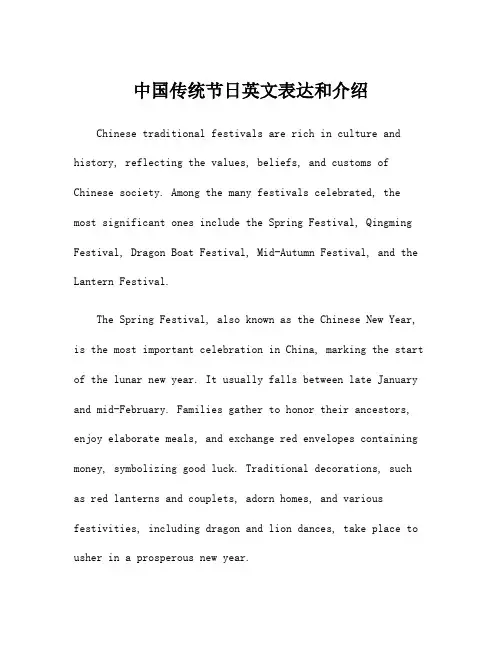
中国传统节日英文表达和介绍Chinese traditional festivals are rich in culture and history, reflecting the values, beliefs, and customs of Chinese society. Among the many festivals celebrated, the most significant ones include the Spring Festival, Qingming Festival, Dragon Boat Festival, Mid-Autumn Festival, and the Lantern Festival.The Spring Festival, also known as the Chinese New Year, is the most important celebration in China, marking the start of the lunar new year. It usually falls between late January and mid-February. Families gather to honor their ancestors, enjoy elaborate meals, and exchange red envelopes containing money, symbolizing good luck. Traditional decorations, such as red lanterns and couplets, adorn homes, and various festivities, including dragon and lion dances, take place to usher in a prosperous new year.Qingming Festival, or Tomb-Sweeping Day, occurs in early April and is a time for families to pay respects to their ancestors. It involves cleaning graves, offering food, and burning incense as gestures of remembrance. People also take the opportunity to enjoy the coming of spring by flying kites and spending time outdoors.The Dragon Boat Festival, celebrated on the fifth day of the fifth lunar month, commemorates the ancient poet Qu Yuan. Traditional customs involve racing dragon boats, which are long, narrow boats decorated to resemble dragons.Participants wear colorful outfits and paddle in sync to the rhythm of drums. Families also prepare sticky rice dumplings, known as zongzi, wrapped in bamboo leaves, symbolizing the efforts of Qu Yuan to save his homeland.Mid-Autumn Festival, celebrated on the 15th day of the eighth lunar month, revolves around family reunions and the appreciation of the harvest moon. People gather to enjoymooncakes, which are round pastries filled with various fillings, symbolizing unity and harmony. Lanterns are lit and children often carry them as they roam the streets, creatinga festive atmosphere. The festival is steeped in legend, especially the tale of Chang'e, the Moon Goddess, who is believed to reside on the moon.Finally, the Lantern Festival marks the end of theChinese New Year celebrations. Occurring on the 15th day ofthe first lunar month, it features colorful lantern displays, lion dances, and various folk performances. Families ofteneat glutinous rice balls (tangyuan), symbolizing togetherness. Traditionally, people write riddles on lanterns for others to solve, adding an interactive element to the festivities.Each of these festivals embodies distinct cultural meanings and practices, showcasing the diverse traditions and communal spirit that define Chinese heritage. Through these celebrations, people maintain connections to their ancestry,forge community bonds, and embrace cultural values that have been passed down through generations.。
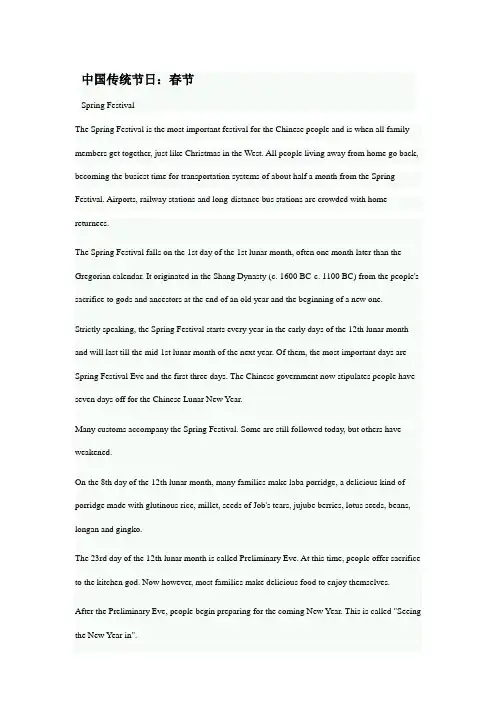
中国传统节日:春节Spring FestivalThe Spring Festival is the most important festival for the Chinese people and is when all family members get together, just like Christmas in the West. All people living away from home go back, becoming the busiest time for transportation systems of about half a month from the Spring Festival. Airports, railway stations and long-distance bus stations are crowded with home returnees.The Spring Festival falls on the 1st day of the 1st lunar month, often one month later than the Gregorian calendar. It originated in the Shang Dynasty (c. 1600 BC-c. 1100 BC) from the people's sacrifice to gods and ancestors at the end of an old year and the beginning of a new one.Strictly speaking, the Spring Festival starts every year in the early days of the 12th lunar month and will last till the mid 1st lunar month of the next year. Of them, the most important days are Spring Festival Eve and the first three days. The Chinese government now stipulates people have seven days off for the Chinese Lunar New Y ear.Many customs accompany the Spring Festival. Some are still followed today, but others have weakened.On the 8th day of the 12th lunar month, many families make laba porridge, a delicious kind of porridge made with glutinous rice, millet, seeds of Job's tears, jujube berries, lotus seeds, beans, longan and gingko.The 23rd day of the 12th lunar month is called Preliminary Eve. At this time, people offer sacrifice to the kitchen god. Now however, most families make delicious food to enjoy themselves.After the Preliminary Eve, people begin preparing for the coming New Y ear. This is called "Seeing the New Y ear in".Store owners are busy then as everybody goes out to purchase necessities for the New Y ear. Materials not only include edible oil, rice, flour, chicken, duck, fish and meat, but also fruit, candies and kinds of nuts. What's more, various decorations, new clothes and shoes for the children as well as gifts for the elderly, friends and relatives, are all on the list of purchasing. Before the New Y ear comes, the people completely clean the indoors and outdoors of their homes as well as their clothes, bedclothes and all their utensils.Then people begin decorating their clean rooms featuring an atmosphere of rejoicing and festivity. All the door panels will be pasted with Spring Festival couplets, highlighting Chinese calligraphy with black characters on red paper. The content varies from house owners' wishes for a bright future to good luck for the New Y ear. Also, pictures of the god of doors and wealth will be posted on front doors to ward off evil spirits and welcome peace and abundance.The Chinese character "fu" (meaning blessing or happiness) is a must. The character put on paper can be pasted normally or upside down, for in Chinese the "reversed fu" is homophonic with "fu comes", both being pronounced as "fudaole." What's more, two big red lanterns can be raised on both sides of the front door. Red paper-cuttings can be seen on window glass and brightly colored New Y ear paintings with auspicious meanings may be put on the wall.People attach great importance to Spring Festival Eve. At that time, all family members eat dinner together. The meal is more luxurious than usual. Dishes such as chicken, fish and bean curd cannot be excluded, for in Chinese, their pronunciations, respectively "ji", "yu" and "doufu," mean auspiciousness, abundance and richness. After the dinner, the whole family will sit together, chatting and watching TV. In recent years, the Spring Festival party broadcast on China Central Television Station (CCTV) is essential entertainment for the Chinese both at home and abroad. According to custom, each family will stay up to see the New Y ear in.Waking up on New Y ear, everybody dresses up. First they extend greetings to their parents. Then each child will get money as a New Y ear gift, wrapped up in red paper. People in northern China will eat jiaozi, or dumplings, for breakfast, as they think "jiaozi" in sound means "bidding farewell to the old and ushering in the new". Also, the shape of the dumpling is like gold ingot from ancient China. So people eat them and wish for money and treasure.Southern Chinese eat niangao (New Y ear cake made of glutinous rice flour) on this occasion, because as a homophone, niangao means "higher and higher, one year after another." The first five days after the Spring Festival are a good time for relatives, friends, and classmates as well as colleagues to exchange greetings, gifts and chat leisurely.Burning fireworks was once the most typical custom on the Spring Festival. People thought the spluttering sound could help drive away evil spirits. However, such an activity was completely or partially forbidden in big cities once the government took security, noise and pollution factors into consideration. As a replacement, some buy tapes with firecracker sounds to listen to, some break little balloons to get the sound too, while others buy firecracker handicrafts to hang in the living room.The lively atmosphere not only fills every household, but permeates to streets and lanes. A series of activities such as lion dancing, dragon lantern dancing, lantern festivals and temple fairs will be held for days. The Spring Festival then comes to an end when the Lantern Festival is finished. China has 56 ethnic groups. Minorities celebrate their Spring Festival almost the same day as the Han people, and they have different customs.春节,是农历正月初一,又叫阴历年,俗称“过年”。
介绍中国传统节日英语作文 介绍中国传统节日英语作文 中国传统节日有春节,元宵节,清明节,七夕......下面是小编为大家整理的介绍中国传统节日英语作文,仅供参考,大家一起来看看吧。
介绍中国传统节日英语作文1 Chinese Spring Festival celebrating the end of winter and the warmth of spring. It began in the last day of the lunar year, end in the 15th day of lunar New Year, also is the Lantern Festival. During the Spring Festival, people use red lantern and Spring Festival couplets decorate a house, put on all kinds of colored clothes, often visit friends and relatives or together eat dumplings, fish, meat and other delicious food. The children are looking forward to receiving red envelope money, and together they play each other the fireworks, with happy. Street with dragon and lion dance and some other carnival activities, CCTV will held the grand Spring Festival gala. 介绍中国传统节日英语作文2 As important as Spring Festival .It is usually celebrated in September or October. This festival is to celebrate the harvest and to enjoy the beautiful moon light. To some extent, it is like Thanks Giving day in western countries. On this day, people usually get together with their families and have a nice meal. After that, people always eat delicious moon cakes, and watch the moon. The moon is always very round on that day, and makes people think of their relatives and friends. It is a day of pleasure and happiness. Hope you have a wonderful Mid Autumn festival! 介绍中国传统节日英语作文3 Far and away the most important holiday in China is Spring Festival, also known as the Chinese New Year. To the Chinese people it is as important as Christmas to people in the West. The dates for this annual celebration are determined by the lunar calendar rather than the Gregorian calendar, so the timing of the holiday varies from late January to early February. To the ordinary Chinese, the festival actually begins on the eve of the lunar New Year‘s Day and ends on the fifth day of the first month of the lunar calendar. But the 15th of the first month, which normally is called the Lantern Festival, means the official end of the Spring Festival in many parts of the country. Spring Festival is the most importantand popular festival in China.Before Spring Festival ,the people usually clean and decorate their houses.And they go to the Flower Fairs to buy some flowers. During Spring Festival ,the adults usually give lucky money to children.People often get together and have a big meal.Some people eat dumpling for dinner. I love Spring Festival .
中国的传统节庆膳食是节日必不可少的伴侣。
例如,我国的端午节(the Dragon Boat Festival)是纪念古代诗人屈原的日子。
那一天,人们通常要赛龙舟、吃粽子(zongzi)。
中秋节是观赏满月的日子。
圆圆的月亮象征着圆满,象征着家庭团聚。
因此,中秋节(The Mid-autumn Festival)的特制食品是一种圆形的月饼。
春节是中国的农历新年(the Chinese lunar New Year’s holiday),除了常见的家禽和肉类之外,人们还要按各自的地方习俗烹制传统食物,如饺子和年糕。
Traditional Chinese holiday meals are indispensable on some festivals. For example, the Dragon Boat Festival is a day established in memory of the ancient poet Qu Yuan and people usually hold dragon boat races and eat zongzi, or rice dumpling on that day. The Mid-autumn Festival is an occasion for viewing the full moon. The round moon is a symbol for completeness and family reunion. The special food of the day is yuebing, a round cake known as the mooncake. The Spring Festival is the Chinese lunar New Yea r’s holiday. Besides the popular poultry and meat, people cook traditional food according to regional customs, for example, jiaozi, or boiled dumplings, and niangao, or the “1 ”new year cake .难点精析■1.中国的传统节庆膳食:翻译为Traditional Chinese holiday meals,其中“节庆膳食”直接译为holiday meals , 即可,翻译时注意“中国的”和“传统”的顺序。
中国的传统节日英语作文中国的传统节日英语作文(精选14篇)中国传统节日春节、元宵节、清明节、端午节、中秋节、重阳节等,你喜欢哪个节日呢?下面是中国的传统节日英语作文,欢迎阅读!the mid-autumn festival is a folk traditional festival of the han and ethnic minorities.as early as three generations,our country had the custom of "autumn twilight".on the eve of the moon,worship the moon.in the zhou dynasty,every autumn night must be held to greet the cold and the moon.in the tang dynasty,the mid-autumn festival,the playing month was very popular.in the southern song dynasty,folk cakes were donated to each other,and the meaning of reunion was taken.in the evening,there were activities such as the moon and the lake.since the ming and qing dynasties,the custom of the mid-autumn festival has become more prevalent,and many places have been formed by the burning of incense,the mid-autumn festival,the dot tower lamp,the sky light and the moon.special customs such as dance dragon.today,the custom of visiting the moon is very little.but feasting is still popular.in ancient times,there were worship and worship activities.the big incense case,put on moon cake,watermelon,apple,pear,grape and other offerings,among them moon cake and watermelon is absolutely cannot little.watermelon is cut into a lotus shape,under the month,will be the moon gods in the place of the moon,red candle high fuel,the whole family,in turn,worship the moon,and then cut by take charge of housewife reunion moon cakes,cutting,good family in advance how many people can cut more nor less.mooncakes are in contact with the mid-autumn festival in the ming dynasty.with relevant information,said at the time,there was a beijing city with fruit fillings of moon cakes,and people in the mid-autumn festival this day make moon cakes,for themselves and to their relatives and friends,to express their reunion and congratulations.at that time,the size and shape of mooncakes were very irregular,very different,and its name was special.medium in county area in shanxi province in the mid-autumn festival this day,for example,the local people have family sat broken reunion moon cake made the custom of the tricks and more interesting,crescent moon cakes,such as one male of consumption has a gourd is limited to a woman to enjoy moon cakes,and especially for kids "monkey king","lord rabbit" moon cakes,and so on.there are so many different names.there are many customs and different forms of the mid-autumn festival,but they all rely on peoples boundless love for life and the yearning for a better life.the traditional custom of the dragon boat festival is to eat zongzi.therefore,our family has a veritable dumpling - my mother.so every year,during the dragon boat festival,our whole family can eat many zongzi.my mother used to say: make zongzi most fragrant with reed leaves.so she wrapped rice dumplings with reed leaves.before making zongzi,she prepared herself: she boiled the reed leaves in the water,washed the prepared glutinous rice and dates,and prepared the work.when the reed leaves were cold,she began to make zongzi.her first three leaves,put the two leaf dish,put a slice of their,caught in the middle of the three leafroll into a round pheasant body appearance,glutinous rice,put on the inside,between a few dates,finally the leaves tied up with lines,a rice dumplings wrapped.she was so fat and fat that she was like a big old buddha sleeping.after she has wrapped the dumplings,put them in a pressure cooker for 40 minutes,and then put them in for another three or four hours,so that when they taste,they can eat them! although the raw materials of my mothers dumplings are extremely simple,the dumplings made out are fragrant.if you smell the smell,it will stir up your appetite.as long as there is a zongzi in front of your table,you will eat it.therefore,whenever i eat zongzi,i always eat a lot of food,probably because the dumplings are too much my taste! when it comes to my taste,i dont know what my mother zongzi "secret",each package dumplings is always delicious,appetite,make the person admire christmas is about to drip,had to eat a lot.in addition to eating zongzi,the dragon boat festival is also a dragon boat festival.i most like to see is the condition of dragon boat racing,dozens of sailor hand paddles,run out whole body with the hand to paddle,high water gesture gas drum roll,hard knocks the regular drum up a bit."come on,come on! at the edge of the field,the cheerleaders were enthusiastic,cheering,shouting and cheering,and the sailors were forced to row harder.the spectacle of the dragon boat race is so spectacular and fierce that it can be said to be unique.it is the traditional symbol of dragon boat festival.eating zongzi and racing dragon boat races,these two traditional customs,together weaves a hot and noisy dragon boat festival.paper cutting is the folk art soul treasure of china,is a folk art of a strange flower,look at let the person envied,tut tut praise.the content of paper-cut contains thick lifebreath.birds,worms,fish,animals,plants and trees,pavilions.the familiar and loving nature of the landscape has become a pattern of paper-cutting.every festival or wedding ceremony,people would like to cut some "fu","xi","shou",and so on the window,the door to celebrate.paper-cut artists have the zodiac to be lifelike and lifelike.even the foreigners marveled,and gave a thumbs up to praise.the chinese zodiac has been printed in stamps and sent to all parts of the world to bring people around the world to understand the paper-cutting culture of chinas great spirit.for example: the mice of the zodiac paper-cut.its head is round; a sharp nose; there was a lot of beard; body is like a big melon seed; its tail is curved,much like the "s" in english; eyes black and small,like little black beans; hand and foot like a point in calligraphy; two ears pricked up,straight,as if they were afraid that someone might find it to be stolen from the table.folk art paper cutting,it shows the brilliance and brilliance of chinese traditional culture.it is a precious historical heritage of our country.Mid Autumn Festival is a traditional festival of China. It used to be as important as Spring Festival .It is usually celebrated in September or October. This festival is to celebrate the harvest and to enjoy the beautiful moon light. To some extent, it is like Thanks Giving day in western countries. On this day, people usually get together with their families and have a nice meal.After that, people always eat delicious moon cakes, and watch the moon. The moon isalways very round on that day, and makes people think of their relatives and friends. It is a day of pleasure and happiness. Hope you have a wonderful Mid Autumn festival!When the traditional festival comes, everybody is excited about it, because they will have holiday to relax. The meaning of these festivals is remembered by the old generation all the time, while some young people do not know. So when we enjoy the holiday, we need to know more about the traditional culture.大家都会很兴奋得知有传统节日将要来临时,因为他们会有假期来放松自己。
考试学资学习网押题中国四大传统节日:春节,中秋节,端午节,清明节元宵节The Lantern Festival ( 元宵节) is the last day of the Chinese New Year celebration. This day is for the last moment for setting off fireworks, the last excuse for eating a big feast and the last chance for family getting together before the “年”celebrations are over. (Latern Festival is also a traditional time of celebration for foreigners who live in China).The Lantern Festival, the 15th of the first month of the lunar calendar, is the first full moon of the year. Celebrations and traditions on this day date back to the Western Han Dynasty.Traditions for this festival: as the name indicates, hanging and looking atlanterns is the main tradition. Lanterns of various shapes and sizes are displayed on trees, or along river banks.Parents often take their children to Lantern Fairs and sometimes lucky kidseven get a mini toy lantern.Another tradition is guessing lantern riddles. These are riddles that are hung on lanterns for people to shoot down and solve. The riddles are usually short, wise, and sometimes humorous. The answer to a riddle can be a Chinese character, a famous person's name, a place name or a proverb. This tradition has become a popular game with serious staying power even as social development changes other traditions.Other than that, the most important thing to do today is to eat sweetdumplings. In northern China, sweet dumplings made of glutinous rice flour are. Typical sweet while in southern part they are called “汤圆” called “元宵” dumplingsare filled with black sesame sauce, sweetened bean paste, or hawthorn.today is like a game or an activity, so it's seldom done without a Making “元宵” reason and a group of friends or family present to help out.端午节The Dragon Boat Festival, also called the Duanwu Festival, is celebrated on the fifthdayof the fifth month according to the Chinese calendar. For thousands of years, the festival wrapped to form a pyramid using has been marked by eating zong zi (glutinous rice (糯米)boats. racing or bamboo dragon reed leaves) and southern in The festival is best known for the its dragon-boat especially races, commemorates the (赛舟会)provinces where there are many rivers and lakes. Thisregattadeath of Qu Yuan , an honest minister who is said to have committed suicide by drowning himself in a river. Qu was a minister of the State of Chu situated in present-day Hunan and was He (战国时期)Period(475-221BC)Hubei provinces, during theWarring States . upright, loyal and highly esteemed for his wise counsel that brought peace and prosperity to the state. However, when a dishonest and corrupt prince vilified Qu, he was disgraced and dismissed from office. Realizing that the country was now in the hands of evil and corrupt officials, Qu grabbed a large stone and leapt into the Miluo River on the fifth day of to unable him but were rushed over to try and save the fifth month. Nearby fishermen even recover his body. Thereafter, the state declined and was eventually conquered by Qin. of the StateThe people of Chu who mourned the death of Qu threw rice into the river to feed his ghost every year on the fifth day of the fifth month. But one year, the spirit of Qu appeared and told the mourners that a hugereptile (爬行动物)in the river had stolen the rice. Thespirit then advised them to wrap the rice in silk and bind it with five different-colored threads before tossing it into the river.to is eaten During the Duanwu Festival, a glutinous rice pudding called zong zi莲seeds (the symbolize rice offerings to Qu. Ingredients such as beans,lotus,pork fat and the golden yolk of a salted duck egg are often added (栗子)子),chestnutsto the glutinous rice. The pudding is then wrapped with bamboo leaves, bound with a kind hours. salt water for of raffia and boiled inQu's and to rescue The dragon-boat races symbolize the many attempts recoverbody. A typical dragon boat ranges from 50-100 feet in length, with a beam of about 5.5 side. by seated side feet, accommodating two paddlers. A A wooden dragon head is attached at the bow, and a dragon tail at thestern (船尾)banner hoisted on a pole is also fastened at the stern and the hull is decorated with red, green and blue scales edged in gold. In the center of the boat is a canopied shrine behind players are seated to set the (铙钹)which the drummers,gong (铜锣)beaters andcymbalpace for the paddlers. There are also men positioned at the bow to set off firecrackers, toss rice into the water and pretend to be looking for Qu. All of the noise and pageantry creates an atmosphere of gaiety and excitement for the participants and spectators alike. The races are held among different clans, villages and organizations, and the winners are awarded medals, banners, jugs of wine and festive meals.清明节Qing Ming is a time to remember the dead and the dearly departed. More important, it is a period to honour and to pay respect to one's deceased ancestors and family members. Because it reinforces the ethic of filial piety, Qing Ming is a major Chinese festival. Literally meaning clear (Qing) and right (Ming), this Chinese festival falls in early spring, on the 106th day after the winter solstice. It is a spring festival, and it is an occasion for the whole family to leave the home and to sweep the graves of their forebears. Chinese being practical people this sweeping of the graves is given an extended period, that is, 10 days before and after Qing Ming day. Among some dialect groups a whole month is allocated.清明节是一个纪念祖先的节日。